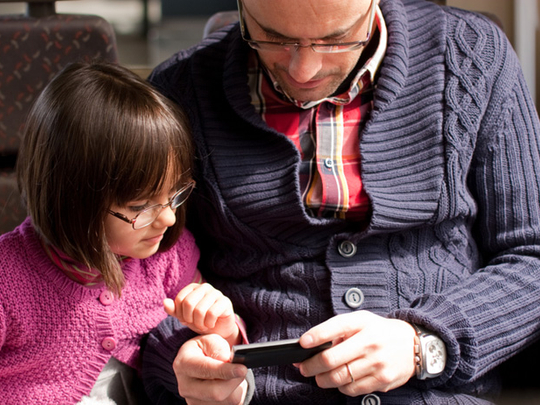
At brunch in Dubai this weekend, we rolled our eyes at a father using a smartphone game to keep his toddler daughter quiet – and buy himself and his wife some eating time. We shouldn’t judge, but that fits right in with the findings of a new survey: fathers are the proactive parents when it comes to introducing small children to gadgets.
The number of fathers who give smartphones or tablets to children before their first birthday is at least double the number of mothers who admit doing the same, data security firm Kaspersky Lab has revealed. A total of 12,355 people aged 16 and over were surveyed from 26 countries last year, including the UAE.
Fathers are also keen supporters of internet connectivity, and two-thirds of fathers who took part in the survey described the web was a great thing for both them and their kids. Also, unlike mothers, dads believe the internet has a positive effect on their children – on their physical and mental condition, their performance at school, their future profession and on their life in general. For example, 45 per cent of fathers think that their children feel more successful and at ease with their friends due to the internet, and 29 per cent believe the web helps make their kids more organised in terms of scheduling their time.
When it comes to gadgets, fathers are more likely to buy them for their children so that they’re not treated as outsiders. For example, half of dads provided their kids with a computer or a laptop with this in mind. Fathers are also convinced that today’s children need to know how to use digital devices, and 36 per cent bought their sons or daughters a tablet because of this.
The good thing, however, is that gadgets aren’t being used as proxy babysitters. Fathers also pay attention to what their kids are doing on the web as the vast majority of men feel responsible both for the financial maintenance of their families and their cyber security. This means it’s usually the father who installs security solutions on all the digital devices at home – 86 per cent said they protected PCs, 77 per cent secured smartphones, and 63 per cent installed anti-malware on tablets.
“Despite all the differences between them, both fathers and mothers want to safeguard their children from any threats – real or virtual. Of course, they are worried that they might not be doing the right thing, that all the fun of gadgets will have a negative effect on their beloved kids, that the internet is maybe not that cool after all,” says David Emm, Senior Security Researcher at Kaspersky. “And yet, they are eager to teach their children how to surf the web safely and how to get the most from modern technologies.”












